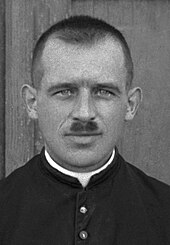Alfons Tracki
Alfons Tracki (born December 2, 1896 in Bleischwitz , † July 18, 1946 in Shkodra ) was a German Catholic priest who worked in Albania and was murdered there during the religious persecution of the communist regime . He is one of the Thirty-Eight Martyrs of Albania of the Roman Catholic Church .
Life
Alfons Tracki, son of Josef Tracki and Martha geb. Schramm, grew up with three siblings in his Upper Silesian place of birth. As a student he came into contact with the Christian School Brothers . At the age of 14 he asked the responsible provincial superior in Vienna for admission to the community. After the novitiate he was dressed on August 16, 1913 and received the religious name Gebhard , after St. Gebhard of Constance . Before the outbreak of the First World War he was sent to Albania and taught a.o. a. Sport at the Franz Xaver College in Shkodra.
During the war he returned to his homeland and did two years of military service. Also in the war years he took the religious vows in several stages . After the end of the war, he returned to Shkodra and began studying philosophy and theology to become a priest. He was ordained priest on June 14, 1925 by the Archbishop of Shkodra Lazër Mjeda .
Tracki became a chaplain at St. Stephen's Cathedral in Shkodra. He founded the Catholic youth organization Viribus unitis ("With united forces"). After the chaplaincy he became a pastor in Velipoja .
The resistance against the Italian and German occupying forces in Albania was led by communist partisans under Enver Hoxha , who acted relentlessly against supposed collaborators . Catholics were under suspicion from the start. Many hid from the new rulers in the mountains. When Tracki was giving the sacrament of the death to a mortally wounded young man , he was arrested and imprisoned in Shkodra on February 13, 1946. On July 17, he was convicted of prohibited priestly order of business sentenced to death and the following day shot .
memories
As a teacher he came into contact with many people and with a number of the later martyrs of Albania. The author of one of the most important works on the persecution of Catholics in communist Albania, Konrrad Gjolaj OFM ("Çinaret"), gives the first explanation about himself - after the date of birth - that he was a student of Tracki.
The later parliamentary president Pjetër Arbnori wrote: "The loss of my teacher hit my heart [...] hard." Tracki had never dealt with politics and spoke Albanian so fluently that everyone thought he was an Albanian. It was an “extraordinary man” of “extreme severity”, behind whom he “hid a wonderful heart and deep human feelings”.
The Catholic Church included Alfons Tracki as a witness of faith in the German martyrology of the 20th century .
Beatification process
The beatification of Alfons Tracki and 37 other martyrs, including Josef Marxen as the second German , took place on November 5, 2016 in Shkodra. The Prefect of the Congregation for the Causes of Saints , Cardinal Angelo Amato , presided over the celebrations on behalf of Pope Francis .
literature
- Pjetër Arbënori : Memories of the German priest Alfons Tracky . In: Werner Daum , State Museum for Ethnology, Munich (ed.): Albania. Between the cross and the crescent . Pinguin, Munich / Innsbruck 1998, ISBN 3-7016-2461-5 , p. 167-171 .
- Helmut Moll (publisher on behalf of the German Bishops' Conference), witnesses for Christ. Das deutsche Martyrologium des 20. Jahrhundert , Paderborn et al. 1999, 7th revised and updated edition 2019, ISBN 978-3-506-78012-6 , Volume II, pp. 1186–1189.
- Helmut Moll : Martyr Pastor Alfons Tracki from Upper Silesia (1896–1946) is beatified . In: Schlesische Nachrichten 20/2008 , p. 7
Web links
Remarks
- ↑ Pjetër Arbnori writes (p. 171) that Tracki has joined a group of anti-communist militants in the mountains.
- ↑ According to Arbnori as early as January 13, 1946.
- ↑ Arbnori lists as charges: preparing an Austrian occupation of Albania, founding a pro-fascist association, recruiting a person for the Gestapo .
Individual evidence
- ^ Helmut Moll : Two blessed mission priests from Germany . In: Church Today. Issue February / March 2019, pp. 18–20, here p. 18.
- ↑ Konrrad Gjolaj, Çinaret. Shkodra 2006, 2nd edition, blurb. ISBN 99943-696-8-7 .
| personal data | |
|---|---|
| SURNAME | Tracki, Alfons |
| ALTERNATIVE NAMES | Tracky, Alfons; Br. Gebhard (religious name) |
| BRIEF DESCRIPTION | German Catholic priest, martyr |
| DATE OF BIRTH | December 2, 1896 |
| PLACE OF BIRTH | Bleischwitz , Upper Silesia , today's Poland |
| DATE OF DEATH | July 18, 1946 |
| Place of death | Shkodra , Albania |
